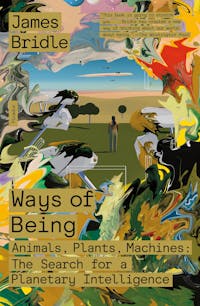Ways of Being
Animals, Plants, Machines: The Search for a Planetary Intelligence
 Download image
Download image
ISBN10: 1250872960
ISBN13: 9781250872968
Trade Paperback
384 Pages
$20.00
CA$27.00
What does it mean to be intelligent? Is it something unique to humans, or shared with other beings—beings of flesh, wood, stone, and silicon? The last few years have seen rapid advances in “artificial” intelligence. But as it approaches, it also gets weirder: rather than a friend or helpmate, AI increasingly appears as something stranger than we ever imagined, an alien invention that threatens to decenter and supplant us.
At the same time, we’re only just becoming aware of the other intelligences which have been with us all along, even if we’ve failed to recognize or acknowledge them. These others—the animals, plants, and natural systems that surround us are slowly revealing their complexity, agency, and knowledge, just as the technologies we’ve built to sustain ourselves are threatening to cause their extinction, and ours. What can we learn from them, and how can we change ourselves, our technologies, our societies, and our politics, to live better and more equitably with one another and the non-human world?
Artist and maverick thinker James Bridle drawn on biology and physics, computation, literature, art, and philosophy, to answer these unsettling questions. Startling and bold, Ways of Being explores the fascinating, strange and multitudinous forms of knowing, doing, and being which are becoming evident in the present, and which are essential for our survival.
Reviews
Praise for Ways of Being
"The ideas in this book are so big, so fascinating and yes, so foreign, you are going to need people to talk to about them . . . This book is going to stretch you . . . Bridle has created a new way of thinking about our world, about being . . . Please read this important book. Read it twice. Talk about it. Tell everyone you know.” —Brenna Maloney, The Washington Post
"Spanning millenniums, continents and academic disciplines, the scope of Bridle’s curiosity and comprehension is immense, and the possibilities of how other intelligences might augment or complement our own are exhilarating to consider . . . There is something hopeful and even heartening in their faith that our current disastrous course might be shifted not only by new policies and technologies but also—and more fundamentally—by the power of new ideas."—Stefan Merrill Block, The New York Times Book Review
“In making clear the patience, imagination and humility required to better know and protect other forms of intelligence on Earth, [Bridle] has made an admirable contribution to the dawning interspecies age.”—The Economist
“There's a new breed of thinkers—people who've grown up through the collapse of an old order and are looking at the first shoots of a very different future. James Bridle is right at the front of this thinking. His writing weaves cultural threads that aren't usually seen together, and the resulting tapestry is iridescently original, deeply disorientating and yet somehow radically hopeful. The only futures that are viable will probably feel like that. This is a pretty amazing book, worth reading and rereading.”—Brian Eno
“James Bridle encourages you to widen the boundaries of your understanding, to contemplate the innate intelligence that animates the life force of octopuses and honeybees as well as apes and elephants. We humans are not alone in having a sense of community, a sense of fun, a sense of wonder and awe at the beauty of nature. Be prepared to re-evaluate your relationship with the amazing life forms with whom we share the planet. Fascinating, innovative and thought-provoking, I thoroughly recommend Ways of Being.”—Dr. Jane Goodall, DBE, Founder of the Jane Goodall Institute & UN Messenger of Peace
"James Bridle’s wonderful book will make you feel and think the power of knowing how like all other lifeforms we are. There is nothing more important."—Timothy Morton, author of Hyperobjects: Philosophy and Ecology After the End of the World
"James Bridle’s brilliant Ways of Being shows the importance of listening to one another and our surroundings, and creating new forms of community."—Hans Ulrich Obrist, artistic director at the Serpentine Galleries, London
"A profound and elegant exploration of nonhuman intelligence that unfurls a wider, more expansive notion of thought itself. Bridle’s view of the mind, embedded in a more thoughtful world, is a revelation."—Alexandra Kleeman, author of Something New Under the Sun
“An accessible but also technologically precise book . . . [Ways of Being] makes a remarkably compelling case for the universality of reason, the benefits to be reaped by acknowledging it, and the urgent need to do so given the reality of looming ecological collapse . . . A provocative, profoundly insightful consideration of forms of reason and their relevance to our shared future.”—Kirkus Reviews (starred review)
"[A] fascinating survey . . . Bridle makes a solid case for his argument that 'everything is intelligent' and that all life on Earth is interconnected, and his notion that intelligence is 'one among many ways of being in the world' is well reasoned and convincing. This enlightening account will give readers a new perspective on their place in the world."—Publishers Weekly
Reviews from Goodreads
BOOK EXCERPTS
Read an Excerpt
1
Thinking Otherwise
Somewhere on the higher slopes of Mount Parnassus a small, dark grey car makes its way along a roughly tarmacked track. The road is fringed with snow; far below, the Gulf of Corinth glitters in the sun. The car...



